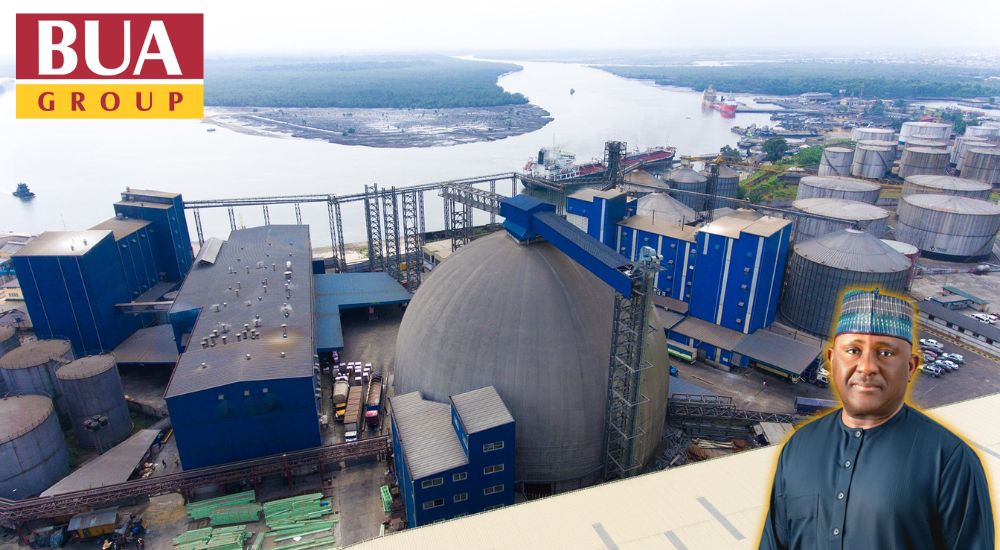- President Bola Tinubu’s fuel subsidy removal has opened Nigeria’s petroleum market to more private investors.
- Abdul Samad Rabiu, Chairman of BUA Group, has announced plans to build a 200,000 barrels per day (bpd) refinery in Akwa Ibom State.
- Nigeria’s long-term goal of self-sufficiency in refined petroleum products could be achieved faster through private sector participation.
- Increased refining competition from BUA and Dangote is expected to reduce petrol prices for consumers.
- Strategic location in Akwa Ibom offers proximity to crude oil supply and access to export markets in West and Central Africa.
President Bola Tinubu’s removal of the fuel subsidy has prompted fresh private-sector investment into Nigeria’s downstream oil industry. One of the most consequential responses is BUA Group’s plan to build a 200,000 barrels-per-day (bpd) refinery in Akwa Ibom, a strategic move that could cut import costs, create jobs, and introduce competition that may help lower petrol prices.
About Abdul Samad Rabiu and BUA Group
Abdul Samad Isyaku Rabiu is a Nigerian industrialist and philanthropist who founded BUA Group, a conglomerate with interests across cement, sugar, flour milling, shipping, and infrastructure. Rabiu’s commercial track record and investments in large-scale manufacturing make his entry into the refining space noteworthy for both industry watchers and policy makers.
BUA’s expansion into oil refining follows a broader strategy of vertical integration moving from raw materials or basic processing into higher-margin, downstream activities that capture value locally.
Project Details: What BUA’s Refinery Will Deliver
Key details announced by BUA include:
- Refining capacity of 200,000 barrels per day (bpd).
- Location: Akwa Ibom State, chosen for strategic proximity to crude supplies and export pathways.
- Technology and engineering partner: Axens (France), a known player in refining process design and emissions control.
- Goals: To supply local markets, reduce import dependence, and export excess capacity to regional markets.
Why Akwa Ibom? Strategic and Economic Justifications
Siting the refinery in Akwa Ibom offers several advantages:
Proximity to Crude
Akwa Ibom sits in the Niger Delta basin an area with ample crude reserves. Local refining reduces the need to transport crude long distances, lowering logistics costs and corporate expenditure.
Port and Export Access
The state’s Atlantic coastline affords deep-water port access, simplifying export logistics to neighboring countries in West and Central Africa.
Regional Development and Jobs
Large industrial projects often catalyze local infrastructure development. A refinery will create both direct jobs in operations and a broader ecosystem of support services such as transport, maintenance, and retail.
The Partnership with Axens
Axens is recognized globally for its engineering, catalysts, and process technologies tailored for refineries and petrochemical complexes. The partnership is positioned to ensure:
- Adherence to international environmental and operational standards.
- Technology transfer and training for local engineers and technicians.
- Access to established process designs that improve efficiency and reduce emissions.
How Subsidy Removal Sparked Investment
The removal of fuel subsidy changed the economics of Nigeria’s downstream sector. Where previously the government absorbed price differentials, market-based pricing now allows private investors to plan long-term returns on refining projects. Though politically sensitive, the policy has unlocked projects that were previously unattractive under subsidy regimes.
Comparing BUA’s Refinery with Dangote’s Facility
Dangote Refinery, with about 650,000 bpd capacity, remains the continent’s largest single refinery. BUA’s 200,000 bpd project complements Dangote’s capacity and expands the country’s refining footprint. Key distinctions include:
- Scale: Dangote is larger but BUA’s project is still material at 200,000 bpd.
- Location: Dangote is sited in Lagos; BUA chooses Akwa Ibom for proximity to crude and export channels.
- Competition: Multiple large refineries suggest a competitive downstream market that could benefit consumers through stabilised prices.
Projected Economic Benefits
If realised, the refinery can deliver substantial macroeconomic and social benefits:
Foreign Exchange Savings
Local refining means less import spending on petrol and diesel. Reduced imports preserve foreign exchange reserves and help stabilise the naira.
Job Creation
Construction and operation phases will employ thousands both directly and in supporting industries such as logistics and retail.
Export Earnings
Excess refined products can be exported to neighbouring countries, generating additional trade revenue.
Technology and Skills Transfer
Working with established technology partners facilitates skills development for the local workforce.
Risks and Challenges
No megaproject is without risks. Key issues to monitor include:
- Funding: Refinery projects require large, long-term capital commitments.
- Regulatory hurdles: Delays in approvals, permits, and government coordination can affect timelines.
- Security: The Niger Delta’s history of unrest poses operational risks.
- Market volatility: Global oil price swings can affect refinery margins.
Industry Views and Expert Commentary
Energy analysts view BUA’s announcement as positive for the sector. Multiple functioning refineries could:
- Increase national refining capacity
- Introduce healthy competition
- Help stabilise domestic fuel prices over time
Experts caution that the timeline and execution quality will determine the ultimate impact on prices and supply reliability.
Impact on Consumers
For Nigerians, an expanded refining sector means improved fuel availability and potential downward pressure on prices as competitive dynamics evolve. Households and businesses stand to benefit from more predictable fuel supply and reduced exposure to import-related price shocks.
Quick Snapshot
Project: BUA Group refinery (200,000 bpd), Akwa Ibom
Partner: Axens (France)
Primary goals: Reduce imports, supply local market, export regionally, create jobs.
In Case you’re not Aware:
- Abdul Samad Rabiu, chairman of BUA Group, is leading the project in partnership with Axens of France.
- The state’s proximity to oil fields, coastal access for exports, and logistical advantages make it an attractive site.
- Increasing refining capacity and competition should help stabilise and potentially reduce pump prices over time, though exact outcomes depend on market dynamics.
- Dangote’s refinery is larger at approximately 650,000 bpd; BUA’s 200,000 bpd refinery adds meaningful capacity and regional competitiveness.
- BUA has not released a firm completion date. Timelines for large refineries vary based on funding, approvals, and construction progress.
In Summary
The entry of Abdul Samad Rabiu and BUA Group into Nigeria’s refining sector represents a pivotal moment for the country’s oil and gas industry. By situating the refinery in Akwa Ibom and partnering with global technology providers, BUA Group is not only contributing to Nigeria’s energy security but also setting the stage for a more competitive petroleum market.
With an estimated capacity of 200,000 barrels per day, the refinery has the potential to significantly reduce Nigeria’s reliance on imported refined products, conserve foreign exchange, and provide employment opportunities for thousands of Nigerians. Its strategic location near crude oil sources and export routes further ensures that Nigeria can take full advantage of regional market demands.
If successfully delivered, this project could mark a turning point in Nigeria’s journey toward self-sufficiency in refined products, reduced petrol prices, and greater economic stability. More importantly, the competition generated by multiple private refineries will give consumers better value, while reinforcing the broader government agenda of energy security and industrial growth.
Abdul Samad Rabiu’s refinery project is therefore more than a business expansion it is a landmark contribution to Nigeria’s economic transformation and a critical step toward reshaping the future of the nation’s oil and gas landscape.













Although looking at first it’s really affect majority of the business but seeing the way are really changing I think, it’s still ok as it is.
Removing fuel subsidy was always going to happen, it was draining governing finances and enriching a few at the expense of the many. Tinubu’s decision sent a strong to investor that Nigeria is serious about market reforms. In that sense, it has opened the door for private capital to flow into refining distribution and alternative energy projects.